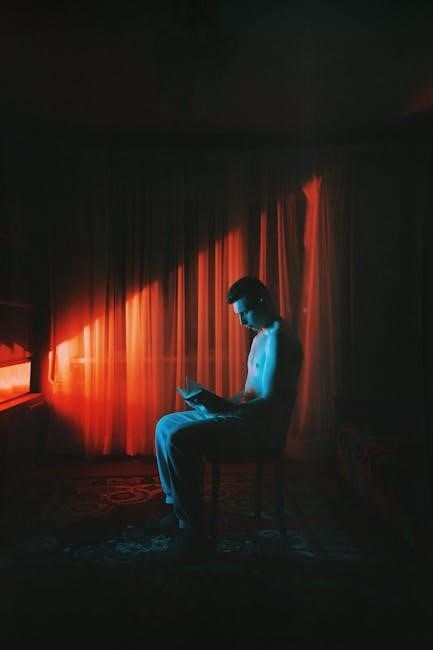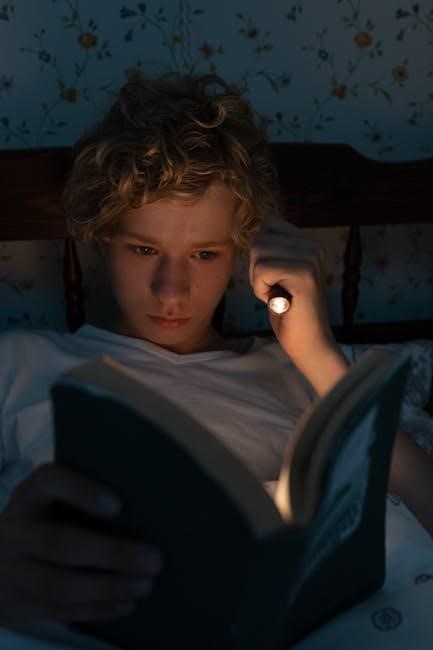Gavin Edwards’ Last Night at the Viper Room is a poignant exploration of River Phoenix’s life‚ career‚ and tragic death‚ offering insights into his rise to fame‚ personal struggles‚ and the cultural impact of his untimely passing at the iconic Viper Room.
Overview of the Book
Last Night at the Viper Room by Gavin Edwards is a compelling blend of biography and cultural history. The book delves into the life of River Phoenix‚ tracing his meteoric rise to fame‚ his personal struggles‚ and his tragic death at 23. Edwards explores River’s early career‚ including his standout performances in Stand by Me and Running on Empty‚ as well as his battles with addiction. The book also examines the broader Hollywood context of the 1990s‚ highlighting the rise of a new generation of actors like Johnny Depp and Keanu Reeves. Using interviews and lesser-known details‚ Edwards paints a vivid portrait of River’s life and legacy‚ offering a poignant reflection on a talent lost too soon.
Significance of the Title
The title Last Night at the Viper Room carries profound significance‚ as it marks the final chapter of River Phoenix’s life. The Viper Room‚ a iconic Hollywood nightclub co-owned by Johnny Depp‚ symbolizes both the glamour and the darker underbelly of 1990s Hollywood. River’s death outside the club on October 31‚ 1993‚ became a defining moment in pop culture‚ encapsulating the fragility of fame and the consequences of addiction. The title captures the essence of a life cut short‚ drawing readers into a story that blends personal tragedy with cultural history‚ offering a vivid exploration of River’s legacy and the era he represented.
River Phoenix’s Life and Career
River Phoenix rose to fame in the late 1980s with critically acclaimed performances in Stand by Me and Running on Empty‚ earning an Oscar nomination at 18.
Early Life and Family Background
River Phoenix was born River Jude Bottom on August 23‚ 1970‚ in Madras‚ Oregon. His parents‚ John Lee Bottom and Heart Phoenix‚ were part of the Children of God cult‚ leading to a nomadic and unconventional upbringing. The family traveled extensively‚ including time in Venezuela‚ where they faced financial struggles and relied on odd jobs. River’s early life was marked by the cult’s influence‚ which later affected his worldview. He and his siblings‚ including future actor Joaquin Phoenix‚ were encouraged to perform and entertain from a young age‚ sparking River’s interest in acting. His unique childhood experiences laid the foundation for his talent and the challenges he would later face.

Rise to Fame in Hollywood
River Phoenix’s acting career began in the late 1980s‚ with his breakthrough role in Rob Reiner’s Stand by Me (1986)‚ earning critical acclaim and establishing him as a rising talent. His performance in Running on Empty (1988) garnered an Academy Award nomination for Best Supporting Actor‚ solidifying his status as a Hollywood prodigy. By the early 1990s‚ Phoenix was hailed as a teen idol and a symbol of the emerging “brat pack” of young actors‚ alongside Johnny Depp‚ Keanu Reeves‚ and Brad Pitt. His nuanced portrayals and magnetic screen presence catapulted him to stardom‚ positioning him as one of the most promising leading men of his generation before his life was tragically cut short.
Personal Struggles and Challenges
River Phoenix faced numerous personal struggles throughout his life‚ including a tumultuous childhood marked by his family’s involvement with the Children of God cult. This upbringing instilled emotional scars and a deep-seated need for escape‚ which often manifested in his reliance on drugs. As his career flourished‚ so did his battles with addiction‚ particularly to cocaine and heroin‚ which began to overshadow his professional accomplishments. Additionally‚ Phoenix grappled with the pressures of fame‚ often feeling suffocated by the expectations placed upon him. His internal conflicts and self-destructive behaviors ultimately led to his tragic downfall‚ as detailed in Gavin Edwards’ Last Night at the Viper Room‚ which paints a vivid picture of his struggles and their devastating consequences.

The Tragic Death at the Viper Room
River Phoenix’s life ended tragically outside the Viper Room on October 31‚ 1993‚ after a fatal drug overdose. His death shocked fans and the industry‚ marking a devastating loss of talent and potential‚ as explored in Gavin Edwards’ Last Night at the Viper Room.
Circumstances Surrounding His Death
River Phoenix’s death occurred on October 31‚ 1993‚ outside the Viper Room in West Hollywood. He suffered a fatal drug overdose‚ specifically a combination of heroin and cocaine‚ which led to seizures and cardiac arrest. The incident happened while he was attending a Halloween party at the club‚ owned in part by Johnny Depp. Emergency services were called‚ but efforts to revive him were unsuccessful. The tragic event shocked fans and the entertainment industry‚ marking the end of a promising career at just 23 years old. Gavin Edwards’ Last Night at the Viper Room delves into the details‚ providing a vivid account of that fateful night and its aftermath.
Impact on His Fans and the Industry
River Phoenix’s sudden death sent shockwaves through his devoted fanbase and the Hollywood community. His untimely passing at 23 halted a career marked by immense promise‚ leaving fans mourning the loss of a talent who had already made significant contributions to film. The tragedy also raised awareness about the dangers of drug addiction‚ resonating deeply within the entertainment industry. Edwards’ book highlights how Phoenix’s legacy endures‚ inspiring new generations of actors and fans who admire his raw talent and authenticity. His story serves as a poignant reminder of the fragility of life and the enduring impact of his work. The outpouring of grief underscored the deep connection he had forged with audiences worldwide.

The Viper Room: A Cultural Icon
The Viper Room‚ a historic West Hollywood nightclub‚ symbolizes Hollywood’s exclusive nightlife‚ once owned by Johnny Depp and others. Its association with River Phoenix’s tragic death forever etched it in pop culture history.
History of the Viper Room
The Viper Room‚ a legendary nightclub in West Hollywood‚ opened its doors in 1993‚ co-founded by Johnny Depp‚ Leonardo DiCaprio‚ and others. Known for its exclusivity‚ it became a hotspot for Hollywood’s elite‚ symbolizing the glamour and excess of the 1990s. The club’s dark‚ intimate setting and strict entry policies made it a haven for celebrities seeking privacy. Its history is intertwined with River Phoenix’s tragic death outside the club in 1993‚ an event that cemented the Viper Room’s place in pop culture. Over the years‚ it has faced financial struggles but remains a cultural icon‚ reflecting the highs and lows of Hollywood’s nightlife scene.

Cultural Significance in Hollywood
The Viper Room holds a significant place in Hollywood’s cultural landscape‚ symbolizing the 1990s’ vibrant nightlife and the rise of a new generation of stars. As a private club‚ it became synonymous with exclusivity and the allure of the Hollywood elite. Its association with River Phoenix’s death added a layer of tragedy‚ making it a poignant symbol of the darker side of fame. The club’s history reflects the shifting dynamics of Hollywood’s social scene‚ from its heyday as a celebrity hotspot to its current status as a nostalgic landmark. Its cultural importance lies in its ability to encapsulate the glamour and excess of an era‚ making it a enduring symbol of Hollywood’s legacy.

Gavin Edwards’ Approach to the Story
Gavin Edwards combines meticulous research with personal interviews‚ blending River Phoenix’s biography with Hollywood’s cultural history to create a comprehensive and emotionally resonant narrative.
Research Methods and Sources
Gavin Edwards conducted extensive research for Last Night at the Viper Room‚ utilizing interviews with individuals close to River Phoenix‚ including family‚ friends‚ and industry insiders. He also drew from published works‚ such as River’s own writings and media coverage of his career. Edwards cross-referenced these sources to ensure accuracy‚ blending personal anecdotes with broader cultural context. His approach included examining River’s childhood in Venezuela and his rise in Hollywood‚ as well as the events surrounding his tragic death. By combining direct accounts with historical analysis‚ Edwards crafted a comprehensive and nuanced portrayal of River Phoenix’s life and legacy‚ offering readers a detailed understanding of his experiences and the impact he left on Hollywood.
Blending Biography with Cultural History
Gavin Edwards seamlessly merges River Phoenix’s personal story with the cultural landscape of 1990s Hollywood in Last Night at the Viper Room. The book contextualizes River’s rise to fame within the era’s shifting cinematic trends and the emergence of new leading men like Johnny Depp and Keanu Reeves. Edwards explores how the Viper Room‚ a symbol of Hollywood’s exclusive nightlife‚ became a backdrop for River’s final moments‚ reflecting the darker side of fame. By intertwining biography with cultural analysis‚ the book offers a vivid portrait of an era‚ highlighting how River’s life and death encapsulated the contradictions of 1990s Hollywood—its creativity‚ excess‚ and the fragility of youth. This blend creates a compelling narrative that resonates beyond River’s individual story.

Legacy and Enduring Influence
River Phoenix’s legacy endures as a symbol of talent and tragedy‚ inspiring new generations of actors and fans. His performances in films like Stand by Me and Running on Empty remain iconic‚ showcasing his depth and vulnerability. The Viper Room incident shocked Hollywood‚ sparking conversations about addiction and mental health in the industry. Gavin Edwards’ Last Night at the Viper Room ensures River’s story is not forgotten‚ preserving his impact on 1990s cinema and culture. His influence is seen in actors who emulate his authenticity and in the ongoing discussions about fame’s darker side. River Phoenix’s brief yet brilliant career continues to resonate‚ leaving an indelible mark on Hollywood’s history.
